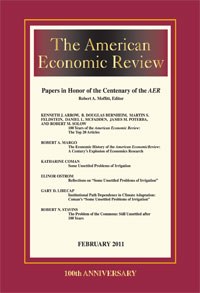
\van Wijnbergen\, S.J.G. (1992). Trade reform, policy uncertainty, and the current account: a non expected-utility approach American Economic Review, 82(3):626----.
-
Affiliated author
-
Publication year1992
-
JournalAmerican Economic Review
Rapid and comprehensive reduction in barriers to international trade has often been followed by a sharp deterioration in the current account. The macroeconomic counterpart of the deterioration has typically been a decline in private savings; no clear response pattern has been observed for private investment. This article observes anticipated policy reversal may explain a decline in private savings for the same reason gradual tariff reduction causes private savings to go up. Temporarily low tariffs lower the relative price of current goods in terms of future goods and thus tend to depress private savings. An anticipated future tariff increase will increase current consumption if the intertemporal substitution elasticity is larger than 1. If consumers internalize the impact of future tariff revenues on their after-tax income, the savings impact will always be negative, even for an intertemporal substitution elasticity below 1. In the standard expected-utility approach, risk aversion is low when intertemporal substitution is high, because the relevant elasticities are each other's inverse.